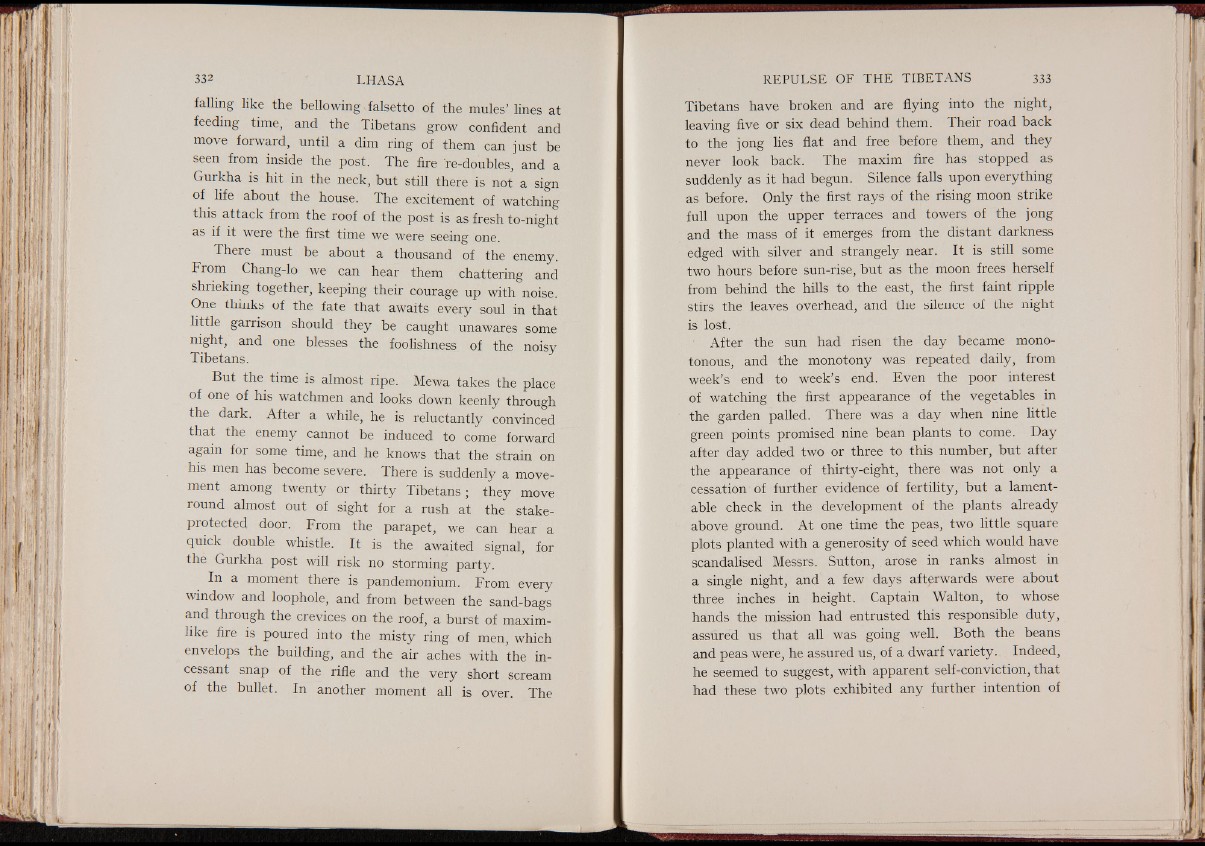
falling like the bellowing .falsetto of the mules’ lines at
feeding time, and the Tibetans grow confident and
move forward, until a dim ring of them can just be
seen from inside the post. The fire re-doubles, and a
Gurkha is hit in the neck, but still there is not a sign
of fife about the house. The excitement of watching
this attack from the roof of the post is as fresh to-night
as if it were the first time we were seeing one.
There must be about a thousand of the enemy.
From Chang-lo we can hear them chattering and
shrieking together, keeping their courage up with noise.
One thinks of the fate that awaits every soul in that
little garrison should they be caught unawares some
night, and one blesses the foolishness of the noisy
Tibetans.
But the time is almost ripe. Mewa takes the place
of one of his watchmen and looks down keenly through
the dark. After a while, he is reluctantly convinced
that the enemy cannot be induced to come forward
again for some time, and he knows that the strain on
his men has become severe. There is suddenly a movement
among twenty or thirty Tibetans; they move
round almost out of sight for a rush at the stake-
protected door. From the parapet, we can hear a
quick double whistle. It is the awaited signal, for
the Gurkha post will risk no storming party.
In a moment there is pandemonium. From every
window and loophole, and from between the sand-bags
and through the crevices on the roof, a burst of maximlike
fire is poured into the misty ring of men, which
envelops the building, and the air aches with the incessant
snap of the rifle and the very short scream
of the bullet. In another moment all is over. The
Tibetans have broken and are flying into the night,
leaving five or six dead behind them. Their road back
to the jong lies flat and free before them, and they
never look back. The maxim fire has stopped as
suddenly as it had begun. Silence falls upon everything
as before. Only the first rays of the rising moon strike
full upon the upper terraces and towers of the jong
and the mass of it emerges from the distant darkness
edged with silver and strangely near. It is still some
two hours before sun-rise, but as the moon frees herself
from behind the hills to the east, the first faint ripple
stirs the leaves overhead, and the silence of the night
is lost.
After the sun had risen the day became monotonous,
and the monotony was repeated daily, from
week’s end to week’s end. Even the poor interest
of watching the first appearance of the vegetables in
the garden palled. There was a day when nine little
green points promised nine bean plants to come. Day
after day added two or three to this number, but after
the appearance of thirty-eight, there was not only a
cessation of further evidence of fertility, but a lamentable
check in the development of the plants already
above ground. At one time the peas, two little square
plots planted with a generosity of seed which would have
scandalised Messrs. Sutton, arose in ranks almost in
a single night, and a few days afterwards were about
three inches in height. Captain Walton, to whose
hands the mission had entrusted this responsible duty,
assured us that all was going well. Both the beans
and peas were, he assured us, of a dwarf variety. Indeed,
he seemed to suggest, with apparent self-conviction, that
had these two plots exhibited any further intention of